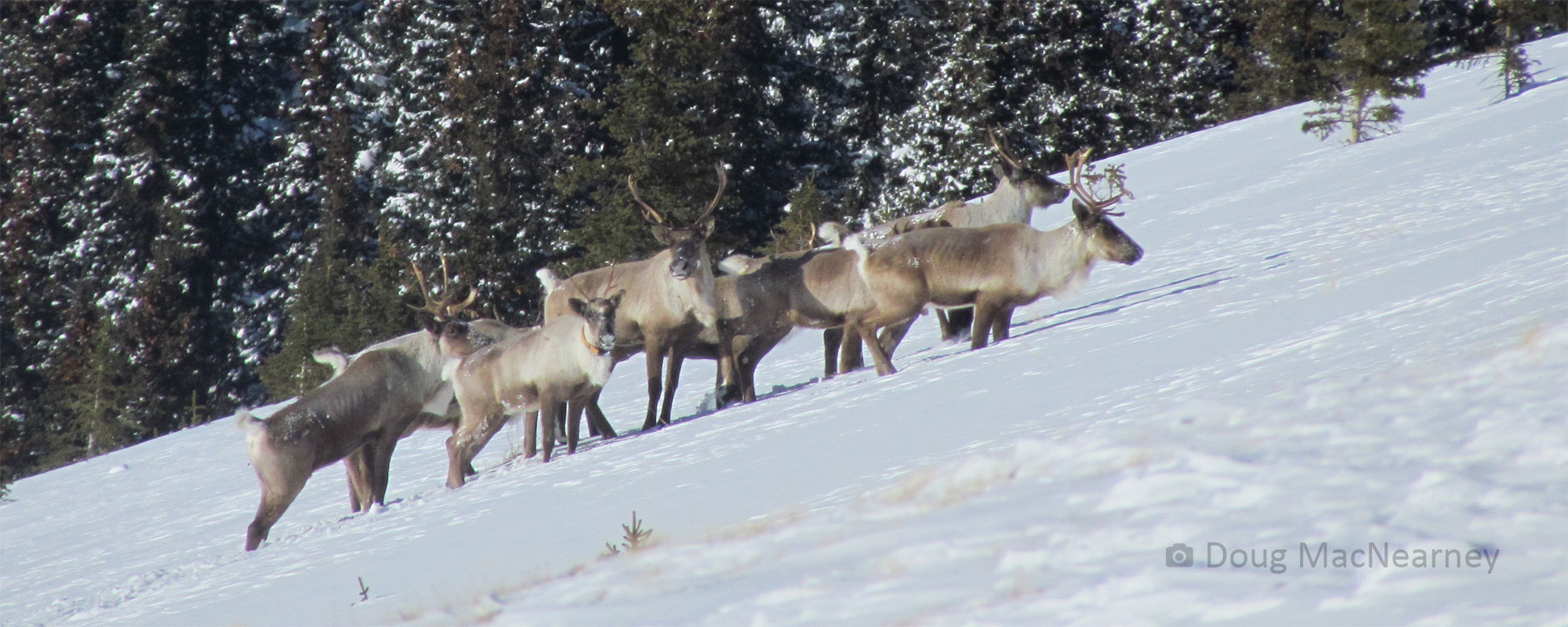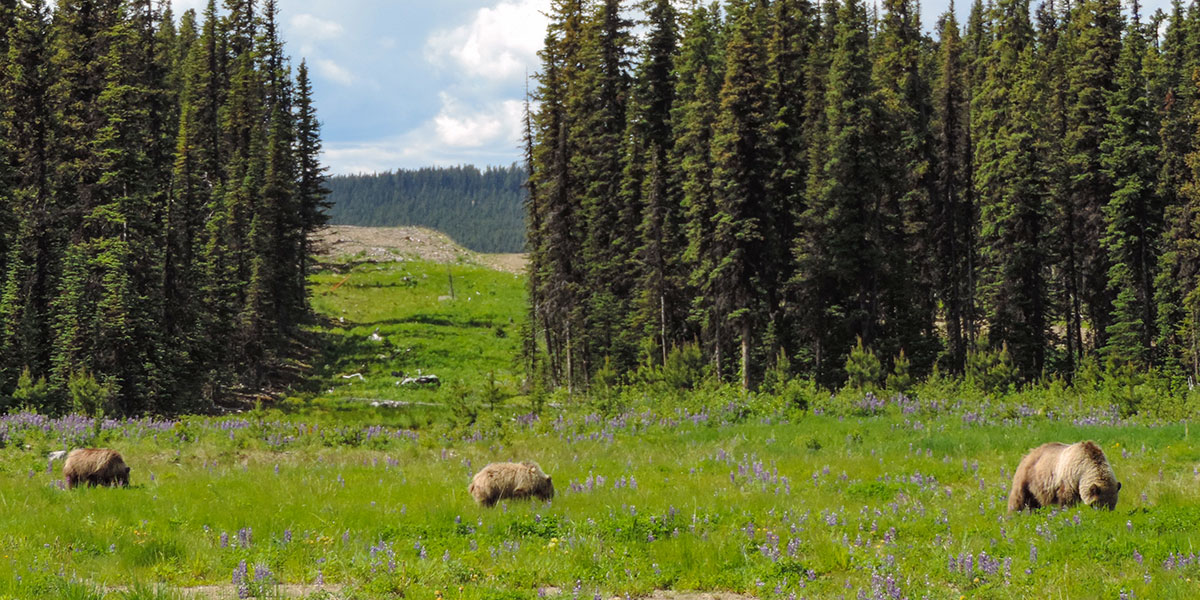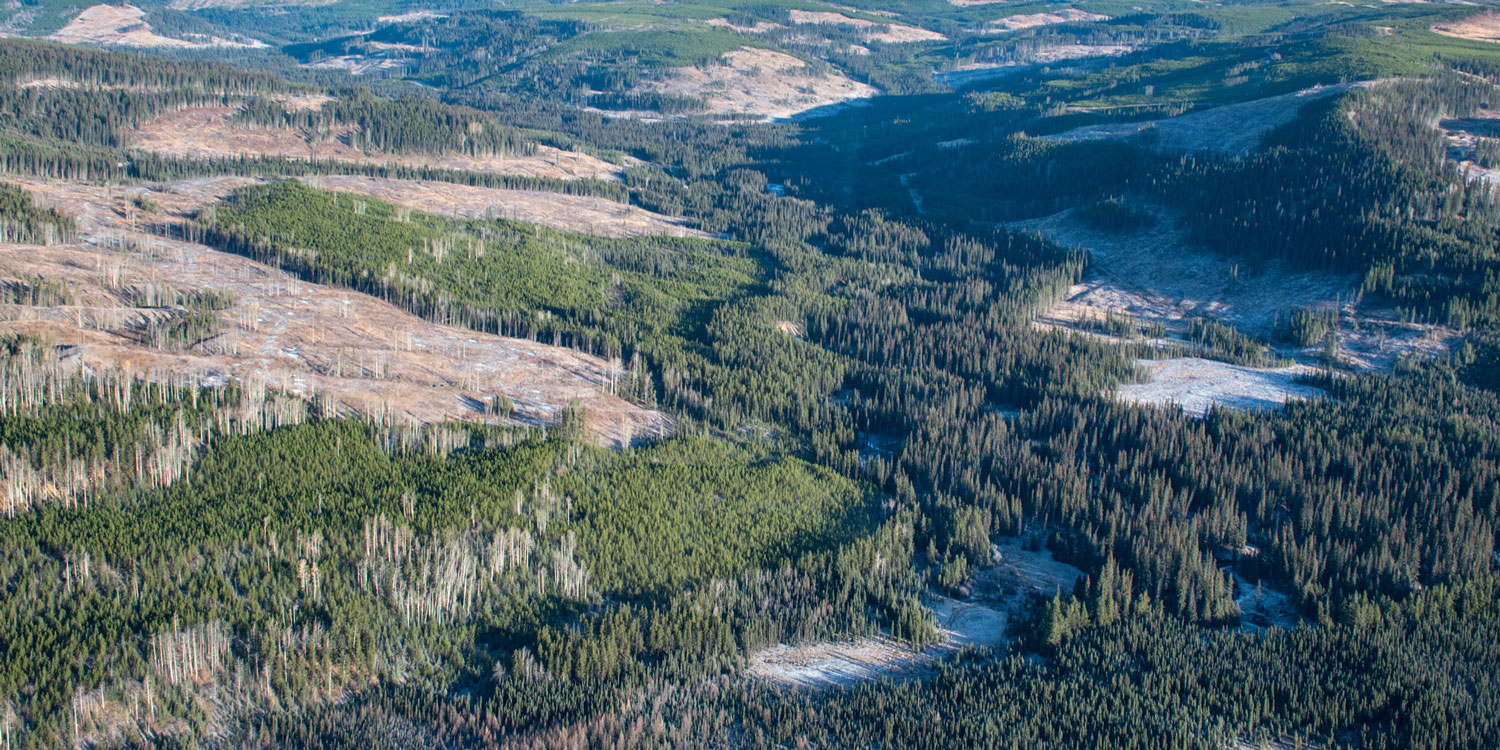Upcoming Webinars
The fourth and final lichen experiment webinar is planned for later this fall. Details will be announced as soon as they become available.
Recent Webinars
Effect of fragment size and substrate on the survival and health of reindeer lichen transplants in harvested blocks
Abstract: Terrestrial lichens, particularly reindeer lichens (Cladonia spp.), are critical components of boreal forest ecosystems and an essential food source for caribou and reindeer. However, habitat disturbance, slow lichen growth, and limited natural dispersal impede the recovery of these lichen communities. This study investigates the viability of reindeer lichen fragment transplantation as a method for habitat restoration in harvested blocks in boreal Alberta. Specifically, we assessed the influence of substrate type (soil, moss, pine needles, and woody debris) and fragment size (small, medium, and large) on the survival and health of transplanted terrestrial lichen fragments in small plot levels. Chlorophyll fluorescence analysis (Fv/Fm) was used to evaluate the health and survival of lichen fragments over three years. Results indicated that larger lichen fragments exhibited significantly higher survival rates than small ones. Lichens grown on moss had significantly lower Fv/Fm values than those grown on soil or pine needles, although mean values were all within a healthy range. Species-specific responses demonstrated that Cladonia stygia. C. stellaris, C. uncialis,and Stereocaulon tomentosum had significantly different Fv/Fm values with different fragment sizes and/or substrates, while the most common species, C. arbuscula ssp. mitis and C. rangiferina, did not. Overall survival differed by species but was similar between the two years of the study, which may indicate that some species are more effective at transplanting than others. Additionally, moss and forb cover were negatively associated with lichen health, suggesting that these species may either indicate poorer lichen growth conditions or compete with lichen fragments. These findings underscore the significance of substrate selection and fragment size in reindeer lichen restoration efforts, offering valuable insights into strategies for restoring lichen communities in disturbed boreal forest habitats.
Presenter: Dr. Jean-Marie Sobze is NAIT’s Business Development Lead and a Registered Professional Forester with more than twenty years of experience in operational forestry, applied research, and industry collaboration. As an Applied Research Chair at NAIT’s Centre for Boreal Research, he has designed and led impactful projects that advance Indigenous-led environmental enterprises, improve native seed technologies, and build capacity among practitioners and community members. His work has supported the development of land-based training programs and reforestation initiatives that integrate traditional knowledge with scientific research. Jean-Marie has also worked extensively with resource development companies and Indigenous Nations across the boreal forest regions of Alberta, British Columbia, and the Northwest Territories.
Presenter: Duoduo Wang is currently a research associate in the Centre of Boreal Research at NAIT, leading projects about lichen transplantation, seed-based reclamation, native plant propagation, and seedling stock improvement. She completed her Ph.D. and MSc in plant science at the University of Manitoba.
Transplanting Lichen into Burned Areas
Abstract: Lichens play a vital role in many ecosystems, and terrestrial lichens are a key food source for endangered woodland caribou during the winter when other food sources are limited. Forest fires can be devastating to terrestrial lichen populations, so the increasing fire regimes Canada is facing due to climate change poses a particular threat to woodland caribou and the lichens they rely upon.
Historical lichen transplantation studies in burned areas provide a unique opportunity to observe long-term community changes, providing key information on the potential of mitigating damage to woodland caribou food sources due to fire. This presentation will review findings from the reassessments of two historic reindeer lichen transplant studies in burned sites in British Columbia. One was established in northern British Columbia nine years ago and included the transplantation of C. mitis, C. rangiferina, and C. uncialis using three methods: mat, fragment, and hybrid. The other was the Tweedsmuir project initiated in west-central British Columbia, exploring three different techniques for transplanting fragments by hand and by air.
Our results indicate promising long-term viability of the transplants regardless of the technique used, with healthy lichen regrowth observed in most treatment plots, with little to no growth occurring in controls. This indicates that transplanting reindeer lichens in appropriate burned habitats has strong potential for mitigating damage to woodland caribou habitat.
Presenter: Michael J. Schulz, M.Sc., P.Biol. is the Research Chair for Environment and Sustainability and instructor in the Environmental Technologist Diploma Program at Portage College. Michael’s Master’s research focused on fungal ecology and biodiversity, and he continues to work with fungi, including teaching mushroom courses and assigning conservation ranks for the macrofungi of Alberta and Saskatchewan as part of the federal government’s 2020 and 2025 Wild Species Reports. The majority of Michael’s professional work has included rare plant surveys, plant and lichen identifications, and wetland and ecosystem mapping. Michael’s current research is focused on new techniques, ecological requirements, and historic efficacy of transplanting ground lichens for caribou habitat restoration, with partners at the NAIT Centre for Boreal Research.
Long-term lichen enhancement for woodland caribou habitat restoration: insights from a 24-year trial
Abstract: Lichens are crucial components of many ecosystems and serve as a key winter food source for caribou (Rangifer tarandus). However, in forest harvest area reclamation, the focus tends to be on replanting trees and shrubs, often overlooking lichens due to their small size, slow growth, and limited understanding of their growth and dispersal requirements. Historical lichen transplantation sites offer a unique opportunity to observe long-term community changes that shorter field trials may not capture. In this webinar, we will show the results in assessing lichen cover, lichen dispersal, vegetation percentage cover in the experimental plots, and ecological site information in a 24-year lichen transplantation trial within harvested pine blocks. We will discuss the effect of different lichen transplanting techniques and lichen species on lichen covers assessed in 2016 and 2024, as well as the extent of lichen dispersal beyond the experimental units in 2024. Our study also includes the relationship between lichen species cover and vegetation cover or other site characteristics.
Presenter: Duoduo Wang is currently a research associate in the Centre of Boreal Research at NAIT, leading projects about lichen transplantation, seed pelleting, and seedling stock quality improvement. She completed her Ph.D. and MSc in plant science at the University of Manitoba.
Improving Woodland Caribou and Fibre Outcomes through the Study to Advance Harvest Systems and Silviculture Practices
Declines of woodland caribou populations are caused by landscape changes that convert mature forests to early seral stands, resulting in habitat loss for caribou, abundant forage for primary prey species, and increased predation risk for caribou via apparent competition. Long-term solutions for caribou conservation will require habitat restoration and adaptive management. Within managed forests, current reforestation strategies as well as future timber harvesting systems and silviculture practices could influence the timeline and effectiveness of re-establishing functional caribou habitat. Differences in forest stand characteristics and habitat attributes between natural disturbances and harvest disturbances may also influence availability of current and future woodland caribou habitat. Adaptive forest management has the potential to contribute towards caribou recovery and could help maintain caribou across the boreal forest in the uncertain face of climate change.
Managing Alberta’s Forests to Achieve Undisturbed Habitat Conditions
Networking the Spatial Structure of Boreal Caribou Populations in Western Canada
Abstract: Delineating relevant local populations of widely distributed species is a common challenge in conservation ecology. In Canada, recovery actions for boreal caribou are stratified by local population units (LPUs), but evidence supporting their boundaries varies widely. We assembled GPS telemetry from 1,586 adult female caribou across the 19 northwesternmost LPUs, spanning northern SK, AB, NT, and northeast BC. We used a network analysis to identify candidate local populations and subpopulations. We detected local population boundaries that in some cases were consistent with accepted LPUs but in other cases were not. Several caribou “communities” at smaller spatial extents were consistent with expert and local knowledge of caribou movements and support recovery planning and actions “stepped down” from entire ranges. These results have important implications for forecasting the population resiliency of caribou.
Presenter: Steve Wilson is a consulting biologist who works at technical and professional levels in strategic and operational planning for wildlife and other ecological values. He specializes in quantitative approaches to decision support and policy analysis. Steve holds a Ph.D. in wildlife ecology from the University of British Columbia in Vancouver.
Exploring the Implementation of Aggregated Harvest in Woodland Caribou Ranges
Abstract: Designing and implementing aggregated harvest sequences has been identified as a key strategy to reduce the impact of forest harvesting on woodland caribou. This approach aggregates forest harvesting into large patches and aims to emulate natural disturbance patterns, reduce access requirements, and help maintain and create larger patches of intact undisturbed caribou habitat. However, there is a lack of understanding of how the scale of aggregation influences caribou habitat, and what tradeoffs exists between harvest aggregation and other values.
In this project, FORCORP Solutions Inc. uses timber supply modelling scenarios to investigate the feasibility and impacts of implementing aggregated harvest scenarios in three of Alberta’s regional caribou planning subregions. They conduct a trade-off scenario analysis using a custom-built modeling environment to quantify how aggregated harvest will affect caribou habitat metrics, other species and values, and socio-economic considerations. This approach has the benefit of a flexible model that allows for the testing of innovative approaches, but importantly, does this in a way that is directly comparable to existing Forest Management Plans. It allows comparisons for non-timber assessments and socio-economic assessments that are part of these plans, providing a greater understanding of aggregated harvest impacts.
Presenter Bio: Logan Purdy has been a Resource Analyst at Forcorp Solutions Inc. for four years, where he has been involved with timber supply modelling, forest management planning, seismic restoration planning in caribou ranges, and growth and yield data collection, management, and analysis. He completed an undergraduate degree in B.Sc. Environmental and Conservation Sciences from the University of Alberta in 2016. He then went on to complete a dual-Masters degree in M.Sc. Conservation and Land Management from Bangor University (Wales) and Master of Forestry (M.F.) from the University of Alberta in 2018.
Other Available Webinar Recordings:
Recordings of ARCKP webinars are available below.
The fRI Research Caribou Program is conducting a multi-faceted project funded by the Alberta Regional Caribou Knowledge Partnership – “A study to advance harvest systems and silviculture practices for improved woodland caribou and fibre outcomes”. The project commenced in 2020 and will be complete in November 2023. To begin the project, the research team conducted a thorough review of available literature, summarizing research that describes differences in responses of caribou and caribou forage to forestry and wildfire. The review, titled Caribou, Fire, and Forestry was published in the fall of 2021. During this webinar, Laura Finnegan, Program Lead for the Caribou Program, provides an overview of the key research cited in the literature review and discusses how the ARCKP study, and other current research, compliment or expand upon this current body of knowledge.
Alternate harvesting and silviculture approaches for promoting caribou habitat
In this presentation, Josh Killeen, a resource analyst and biologist with the consultancy FORCORP Solutions, presents findings from a recent review FORCORP conducted for the ARCKP. In this review, FORCORP identified alternative silvicultural systems applicable to Alberta’s forests using literature review and subject-matter expert interviews. These systems were carefully reviewed for their potential to alter post-harvest vegetation dynamics in ways that may be beneficial to woodland caribou, relative to existing clearcutting systems. A number of case studies from both conifer-dominated and mixedwood-dominated landscapes were reviewed in this context, as well as in the context of access requirements and economics. This led to a number of recommendations, including for a large-scale harvest planning program in caribou range, utilising a multidisciplinary team including silviculturalists and biologists.
This webinar includes two feature presentations: 1) Disentangling the effects of anthropogenic habitat alteration from climate on white-tailed deer densities (Maud Laurent, Former Research Assistant, Caribou Monitoring Unit, ABMI & Melanie Dickie, Caribou Coordinator, Caribou Monitoring Unit, ABMI) and 2) Human-made landscape features bolster white-tailed deer invasions: from behaviour to population distribution across the Alberta boreal forest (Jason Fisher, Lead at the Applied Conservation Macro Ecology Lab, University of Victoria & Cole Burton, Associate Professor, Department of Forest Resource Management, University of British Columbia).
A review of lichen transplant studies and methods
This webinar presents key findings from an ARCKP-funded literature review on lichen transplant studies and methods. Presnters Michael Shultz, a Natural Resources Program at Portage College, and Ricky Kong, a Research Assistant at the Plant and Seed Technologies Program at CBR-NAIT, summarize previous transplant methods and techniques and highlight some important case studies. They also discuss deploying lichens at an operational scale, and the knowledge gaps that currently exist for lichen research. This review is part of a larger ARCKP project that is examining the effects of lichen fragment size and substrate type on lichen growth in both a greenhouse and field setting, with the aim to increase the abundance of lichen forage in caribou habitat.







